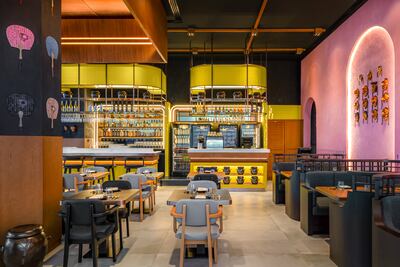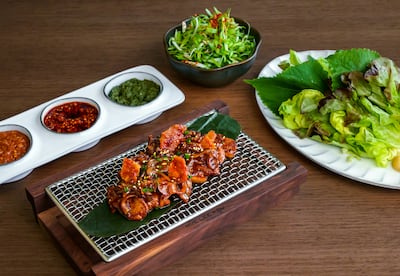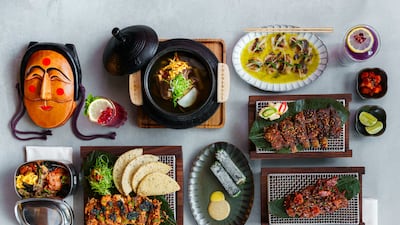From K-pop to K-drama, the export of South Korean entertainment is in full flow.
But it’s not merely the eyes and ears being stimulated by the cultural takeover, now chef Reif Othman’s latest venture, Hoe Lee Kow, is captivating taste buds with off-the-wall Korean barbecue.
And, despite the K-ringeworthy name, it’s quickly building a reputation for memorable dishes.
Where to sit and what to expect
Hoe Lee Kow is opposite Dubai Hills Mall, tucked away in the nearby business park. However, it’s close enough for a brisk walk from the mall’s multistorey car park.
Inside, there are an assortment of tables for two, private booths with soft-to-touch fabric backings and a New York Art Deco-style central bar. It’s low-lit, straddling the classy side of darkness, with a few pops of flair by way of pastel-coloured fans adorning one wall, and Hahoetal theatrical masks on the other. The faces range from coy smirking to maniacal grinning and date from the 12th century when they were used in traditional dances.

The menu
I’ll confess, aside from whacking spoonfuls of kimchi on to my plate in pursuit of overnight abs on the advice of internet health gurus, I’m a novice when it comes to K-food. Chef Othman promises “unconventional” Korean dishes, but it's lost on me – I don’t know my gimbap from my galbi.
I presume the menu – one of the most exciting I’ve seen in months – is fusion in full flow. Ninety per cent of it is made up of small plates, with a smattering of bigger mains such as grilled steaks and fish.
And while the majority of them are Korean dishes, the unconventional part comes by way of the international ingredients used – Wagyu beef, Australian lamb, Irish duck, Scottish salmon – and spins on classic recipes.

Thankfully, no doubt after seeing my struggles and worrying about having a half-wit on her hands, the friendly waitress kindly points out that I can see pictures of the dishes by scanning a QR code on my phone.
Much better, it’s like a Christmas catalogue (ask your parents) and my dining partner and I can point gormlessly at the photos to order rather than butcher the pronunciations and hope for the best.
Soon, the kitchen is firing out plates on a served-when-ready basis. The chicken mandu are four delicate dumplings packed with divinely seasoned fillings in a shallow bath of peanut sauce split with chilli oil; the Wagyu steam bun is a pocket-sized burger with mighty flavour; the banchan potato are baby roasties that are so soft they’re almost velvety and served on a fiery kimchi sauce; and the crispy baby calamari is a playful Korean riff on the Italian classic.
But it's not all fun and squid games, there is some serious technical skill on show. The house gimbap is a delicate nori roll that has been deep-fried tempura-style before being stuffed with raw tuna and dabbed in diced chives on either end. It’s like a savoury cannoli, served alongside truffle mayo.
The simply outstanding tteokbokki – more on it later – brings the inventive, eccentric small plates to a close.
Mains of grilled mackerel fillet and thinly sliced flame-grilled Wagyu strips – nothing too unorthodox here, I should note – extend the prowess Othman has built his name on in the city.
There’s just enough time (and room) to get back to the slightly bonkers recipes with a sweetcorn ice cream so good, it makes one wonder why all vegetables aren’t served this way.
Stand-out dish

The tteokbokki is one of Dubai’s best dishes, hands down. The dish, I learn, is a twist on the traditional garaetteok street food, which are 5cm cylinders of rice flour that are typically left plain and used to dip in sauces.
Here, they’re given a crunchy coating before being supremely well seasoned and deep fried. They’re finished with grated Manchego and maple beef bacon jam, and sit in an aerated cheesy, silky foam dip. It’s a bowl of unbridled happiness and, if this is unconventional food, I’m all ready to embrace the new norm.
I leave with a grin wider and more delirious than any Hahoetal mask and carrying the hope food is South Korea's next big export to our shores.
Price points and contact information
Kimchi and small sides range from Dh20 to Dh58; hot and cold starters range from Dh46 to Dh128; ramen and rice dishes range from Dh70 to Dh130; and mains and grills cost up to Dh328.
The restaurant is open noon to 11pm, Sunday to Thursday; and noon to midnight, Friday and Saturday; Building 4, Dubai Hills Business Park. Reservations can be made at hoeleekow.com.
This review was conducted at the invitation of the restaurant


